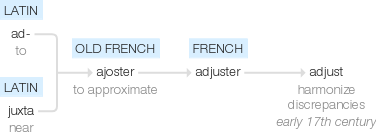Adjust
early 17th century (in the senses ‘harmonize discrepancies’ and ‘assess loss or damages’): from obsolete French adjuster, from Old French ajoster ‘to approximate’, based on Latin ad- ‘to’ + juxta ‘near’.
wiktionary
From Middle English ajusten, borrowed from Middle French adjuster, or Old French, from Latin ad(“to, up to, towards”) + iustus(“correct, proper, exact”). Probably influenced in sense by Old French ajouster (cf. modern ajouter), from Vulgar Latin *adiuxtāre, from Latin iuxta. The Middle English originally meant "to correct, remedy" in the late 14th century, and was reborrowed from Middle French in the early 17th century. According to another view on the etymology, the word was actually derived from Old French ajouster and then supposedly later influenced by folk etymology from Latin iustus [1].
etymonline
adjust (v.)
late 14c., ajusten, "to correct, remedy," from Old French ajuster, ajoster "add; assemble; calibrate, gauge, regulate," from Late Latin adiuxtare "to bring near," from ad "to" (see ad-) + Latin iuxta "next, close by," from suffixed form of PIE root *yeug- "to join."
In 16c. French corrected to adjuster, but the pedantic effort was rejected and Modern French has ajouter. Influenced in form and sense by folk-etymology, as if from ad- + iustus "just, equitable, fair." English reborrowed the word by c. 1600 in sense "arrange, settle, compose," from French adjuster "fit (things together) properly, put things in order." Meaning "to arrange (something) so as to conform with (a standard or another thing)" is from 1660s. Insurance sense is from 1755 (see adjuster). To adjust to "get used to" is attested by 1924. Related: Adjusted; adjusting.
